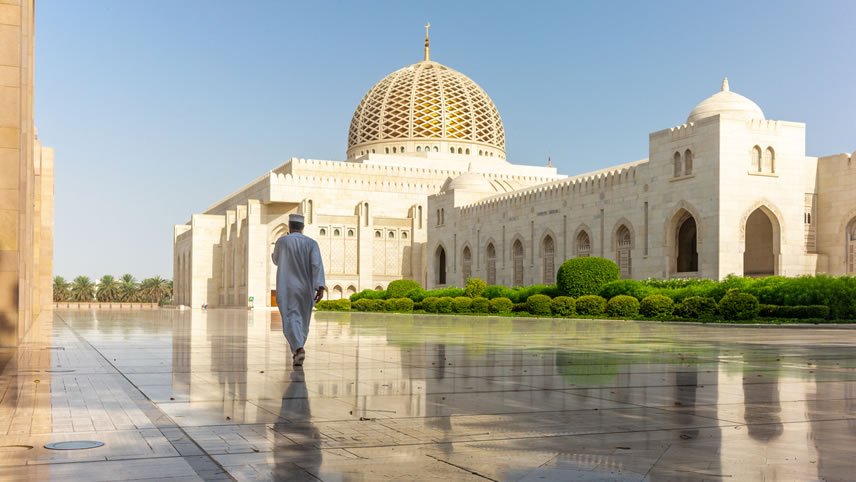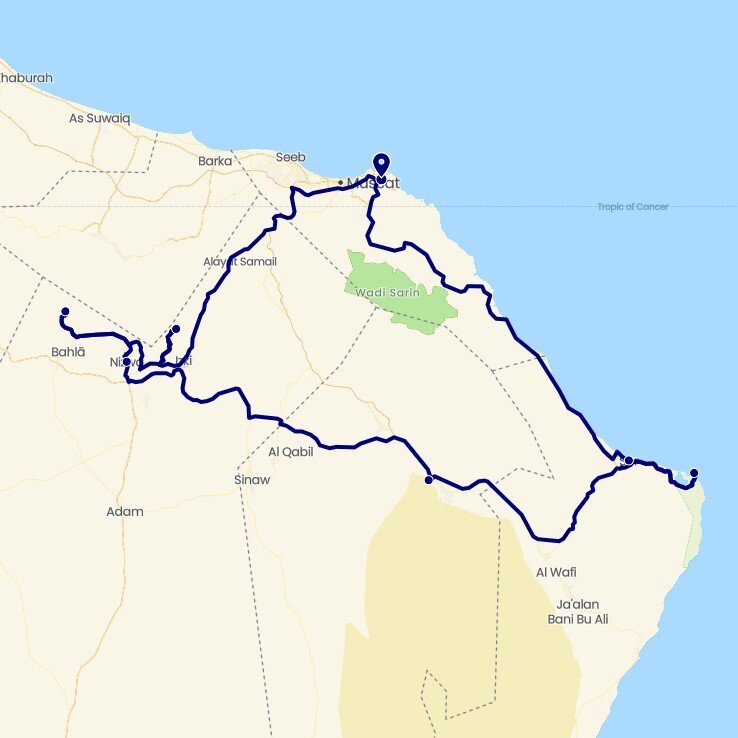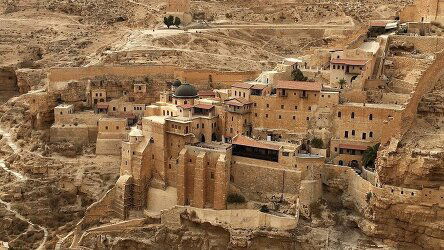Overview
Itinerary
Welcome to Muscat! Scenically wedged between mountains and ocean, with old forts and excellent museums, an opera house and flower-filled parks, the gentle city of Muscat is a delight to visit. Upon arrival, you will be met and transferred to your hotel. Spend the afternoon relaxing at your hotel before enjoying a cooking class at the fishing village of Sidab. Enjoy cooking with the Sidab women whilst interacting with the locals and learning about their culture and traditions. You will be cooking traditional Omani food and have the opportunity to enjoy what you have prepared with the local women.
Enjoy a visit to the Bait Al Zubair museum. This privately owned museum is located in the old town of Muscat and is known for its fine collection of traditional costumes, antique jewellery, weapons and other treasures. Embrace a photo opportunity at Al Alam Palace, the palace of the Sultan, before you visit the Mirani and Jalali forts (outside only). Move on to visit Muttrah Souq, which is one of the oldest markets in Oman, dating back over two hundred years. Its history and antiquities only increase the extent of its beauty, magic and allure. The gold souk here is one of the highlights! Bargain with the locals and see what treasures you can uncover in the labyrinth of twisting and winding alleyways. Dinner this evening is at the Turkish Diwan restaurant. Stay: Grand Millennium Muscat or similar (D)
- Distance: Approx. 80km for the day
Begin your day with a delicious breakfast before departing on your Muscat city tour. Your first stop will be the impressive Grande Mosque which stands exquisitely against the skyline. A beautiful Swarovski chandelier and a huge handmade Persian carpet adorn the main prayer hall. After an architectural competition to select the best design for the Sultan Qaboos Grand Mosque, the construction took six years. Please consider the dress code for the visit of the Grand Mosque: Women must fully cover their hair, arms and legs; men must wear long trousers and a shirt. Visits are not possible on Fridays.
A beautiful photo opportunity awaits you at Birkat Al Mouz, one of the most famous villages lying in ruins in Oman. With a large banana plantation and scenic surroundings, the site is also home to the old falaj irrigation system, a UNESCO World Heritage Site which provides mountain water to the villages via a canal like system. It is an enchanting stop that will transport you back in time. Visit the village of Al Hamra, one of the best-preserved old towns in the country and the home of the Bait Al Safa living museum. Stroll in between the old, abandoned buildings and traditional mud houses. Visit the museum and learn about Omani traditions with both men and women demonstrating ancient practices. Stop at the old village of Ghul to see the abandoned Persian ruins. Arrival at Jebel Shams, Oman's highest point at 3,009m. It is truly an amazing sight at all times of the day. Enjoy the spectacular view of Oman's “Grand Canyon”. Stay: Jebal Shams Resort or similar (B/L/D)
- Distance: Approx. 310km for the day
Enjoy breakfast at your hotel before starting the day with a photo opportunity at Wadi Nakhar, which is one of the most beautiful valleys in Oman. It is a very deep valley and consists of several branches.
The valley is a beautiful destination for mountaineering and hiking. Continue to Misfat Al Abriyeen, a village that boasts amazing agricultural terraces, beautiful alleys, and old houses built on top of solid rocks. The old houses in Misfat Al Abriyeen are traditional mud houses with palm frond roofs and are unique in that they are built on solid rock foundations. Here you will also see traditional Omani irrigation channels (falaj system), where water is channelled from underground sources to support agriculture and domestic use. Visit Nizwa, the former capital of Oman. Explore the 17th-century Nizwa fort with its vast tower and superb views of the oasis. In the bustling souq nearby, you will find local products such as Omani daggers (khanjar), copper, silver jewellery, livestock, fish, vegetables, and handicrafts for sale.
Discover Jebel Akhdar (the green mountain). It is neither green nor a single mountain, but a large grey-brown massif covering more than 1,800 square km with several peaks, rising to nearly 3,050 metres. The mountain range is dotted with Omani villages and in many areas, villagers have dug terraces in parts of the mountain for growing crops. Wadi Bani Habib is one of several interesting villages located on the massive plateau. Jebel Akhdar is also famous for rose water distillation. Of the thousands of varieties of rose, only a few produce the fragrant oil required to make rosewater, ‘damascina' being prized variety. The rose season begins mid-March and finishes mid-May. Stay: DusitD2 Jebel Akhdar Hotel or similar (B/L/D)
- Distance: Approx. 160km for the day
After breakfast, set off for a trek in Jebel Akhdar. This is Oman's premier walking/trekking area offering gentle walks between its villages, to tough traverses of its highlands, to thrilling tramping and clambering in its wadis (gorges).
You will embark on a trek that leads you into the wadi and through abandoned village of Masirat Ash Shuraqiyin, granting you spectacular vistas of the Hajar Mountains. Along the way, you'll encounter the hidden gem of Al Khutaymi village and a vast cave before arriving at the exhilarating natural swimming pool in Jebel Al Akhdar, where you can take a refreshing dip in its cool waters. Throughout the hike, you'll be captivated by enchanting mountain landscapes, and you'll be treated to the picturesque sight of date plantations. The remainder of your day is at leisure. Stay: DusitD2 Jebel Akhdar Hotel or similar (B)
- Walking Distance: Approximately 7.5km
- Walking Time: Approximately 5-6hours
- Difficulty: Moderate, The path on this route is well-maintained but may present some obstacles.
- Distance: Approx. 125km for the day
Following breakfast, make your decent and visit the Women's market in Ibra which is held every Wednesday. Visit the enchanting Wadi Bani Khalid. Drive past the village with its endless date plantations until you reach the magnificent wadi. The pools are cool, deep and absolutely stunning. Feel free to plunge in and experience the crystal-clear waters. After lunch, drive to the impressive Wahiba Sands which are vast mass of red and white sand with dunes rising to 200 metres, home to a variety of flora and fauna. Have your own sand bashing fun with our well experienced driver riding the dunes on the way to the camp site. Stay: Arabian Oryx Camp or similar
- Distance: Approx. 340km for the day (B/L/D)
Breakfast this morning is at your camp site. Witness the sunrise over the rolling dunes as the colours morph with the rising of the sun. Set off before stopping in Jalan Bani Bu Ali at the Hammouda mosque, an architectural masterpiece that has kept traditions alive. The mosque, famous for its characteristic 52 domes, is built in beautiful geometric design. It was constructed in an age that lacked modern technology and engineering. This architectural marvel is the only one in the area that has a falaj or waterway. Continue to Jalan Bani Bu Hasan castle, a solid, squat building that has been well restored (open Saturday-Thursday 08:30-16:00, Friday 08:30-11:00). Arrival at Al Ashkara (named after a poisonous desert plant), the key city of this area. Explore the stunning sandy beaches, where you might see different species of birds. The seas and tides here are very rough compared to the shores of Muscat. Visit the Ras AI Jinz Turtle Reserve, world renowned for the nesting of the endangered green turtle, Chelonia mydas. The reserve is one of the most important nesting sites in the Indian Ocean. Stay: Resort Ras Al Hadd Holiday or similar (B/L)
- Distance: Approx. 300km for the day
Heading back towards Muscat today, trek and swim at Wadi Shab. Fresh water cascading from the top of the mountains meets the briny sea water on its banks, creating an environmental diversity unique to this wadi and making it stand on a pedestal of its own when compared with the other wadis (valleys) in the Sultanate. Stop at Bimah sinkhole, a deep natural depression filled with turquoise water. The locals say that a meteor fell on this spot resulting in the natural depression and forming a small lake. Stop at the fishing village of Quriyat, dating far back into Omani history as a vital sea port. It is well known for its stocks of kingfish and tuna. Transfer to Muscat Airport here your tour ends on arrival. (B/L)
Note: Trek and swim at Wadi Shab is only feasible if guests have an evening flight or extension night in Muscat
- Walking Time: Approx. 2hrs return
- Walking Difficulty: Easy, with rough surface of rocks and pebbles
- Distance: Approx. 270km for the day
Trip Inclusions
- Get hands on in a cooking class in a local fishing village
- Explore lush wadis and abandoned villages
- Wander through date plantations and mud brick villages, drink fresh mountain water straight from the falalj
- Admire the natural beauty of Jebel Sham, Oman's Grand Canyon
- Overnight under the stars in Wahiba Sands
- Mingle with the local Bedouin community over tea
- Witness turtles laying their eggs on the beach at night
- Swim in remote wadis and the Bimah Sinkhole
- Return airport transfers
- 6 nights accommodation
- Meals as per the itinerary
- Transportation in luxury air-conditioned vehicle
- Services of a professional English-speaking guide for all transfers and excursions.
- Sightseeing as per the itinerary
- All taxes and services charges currently applicable by the government
- International and domestic flights
- Visas
- Travel and medical insurance
- All services, meals other than those indicated above
- Any changes to the proposed and confirmed program.
- All items of a personal nature e.g. drinks, laundry, telephone calls, tips etc
- Accommodation, itinerary and inclusions subject to change.
- Disruptions to itinerary may occur.
Availability
Your Global Journeys Travel Advisor will check the availability of your departure date when you enquire. Additional savings may apply. We guarantee the lowest price in Australia. T&C’s apply.
Tour & cruises prices are per person. Prices shown have savings applied, are subject to availability and may be withdrawn at any time without notice. Pricing and trip details are correct at this point in time, however are subject to confirmation at the time of booking and are subject to change by Crooked Compass. For cruise itineraries, cabin images are sourced from Crooked Compass. These should be treated as indicative only. Cabin inclusions, upholsteries and room layout may differ to the image(s) shown depending on the ship selected and your sailing dates.









